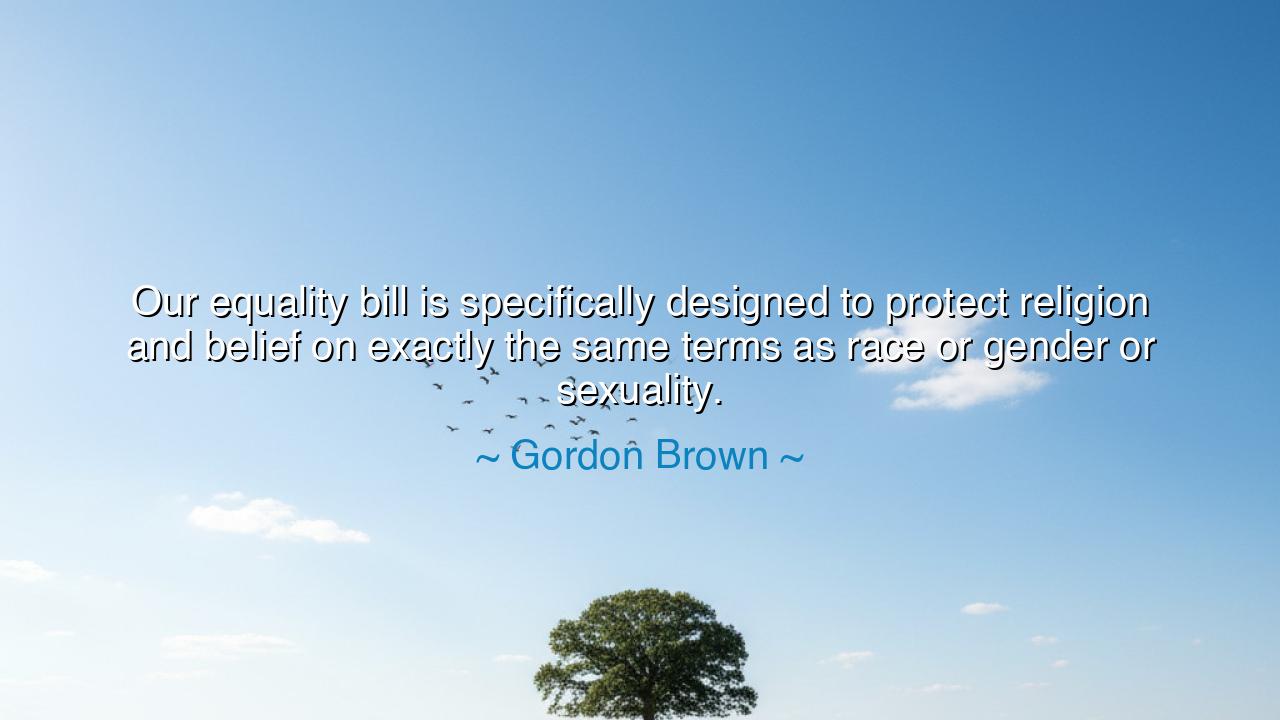
Our equality bill is specifically designed to protect religion
Our equality bill is specifically designed to protect religion and belief on exactly the same terms as race or gender or sexuality.






In the words of Gordon Brown, “Our equality bill is specifically designed to protect religion and belief on exactly the same terms as race or gender or sexuality.” This declaration is not merely political—it is a statement of principle, forged in the long struggle of humankind to live together with dignity. Brown, a leader deeply rooted in the moral traditions of justice, here affirms that equality cannot be partial, nor can it be selective. If it is to be true, it must be whole. It must extend its shield to every human being, in every aspect of their identity.
For centuries, peoples have fought to gain recognition under the banner of equality. At first, it was the struggle of slaves to be free, then of women to be seen as equal partners in society, then of minorities to be protected from the cruelty of prejudice. In modern times, the call for equality has extended to those of different faiths and to those of none. For what is religion, if not the expression of conscience and the pursuit of truth as one understands it? And what is belief, if not the compass that guides a soul through life’s uncertainties? To deny equality to these is to deny the very essence of freedom.
The ancients knew this well, though they often failed to live it. The Romans, in their empire, allowed conquered peoples to keep their gods, but only so long as they bowed before Caesar. The Jews, steadfast in their faith, resisted this command, and their defiance cost them dearly. Their story is a reminder that the struggle for the protection of belief is not new; it is as old as the first law and the first empire. Gordon Brown’s words belong to this ancient continuum, a recognition that modern societies must avoid the errors of the past by enshrining protection not only for the body but for the soul.
Consider also the struggles of the Reformation. When Martin Luther nailed his theses to the church door, he ignited a firestorm that spread across Europe. Countless lives were lost in wars of faith, and the continent was scarred by persecution. Out of this chaos arose a new understanding: that society cannot survive if one faith seeks to crush another. The Enlightenment, centuries later, gave birth to the principle of religious tolerance, enshrining it in law. Brown’s equality bill, then, is not an isolated act but the fruit of centuries of hard lessons: that peace comes only when all are protected, when religion and belief stand beside race, gender, and sexuality as equal before the law.
The deeper meaning of Brown’s statement is that equality cannot be divided into categories of greater or lesser importance. If we protect the body from harm but not the conscience from suppression, then equality is only half-formed. If we honor gender but neglect faith, or defend sexuality while mocking belief, then justice is still unfinished. True equality is indivisible. To weaken one part is to weaken the whole.
The lesson for us is profound: if we wish to build societies that endure, we must protect not only the visible differences—color of skin, form of body, manner of love—but also the invisible ones: the beliefs that live within the heart. To protect only what is seen is easy, but to defend what is unseen, what is whispered in prayer or held in silence, is the true test of justice.
Practical actions flow from this wisdom. Respect the faiths and convictions of others, even when they differ from your own. Defend the right of conscience, whether for the believer or the skeptic. Demand laws that uphold equality in all its forms, refusing to let one group be excluded. And in your daily life, treat each person’s identity as sacred, for to dishonor their belief is to dishonor their humanity.
Thus, Gordon Brown’s words shine as both reminder and challenge. They tell us that equality is not complete until it protects the whole person—body, mind, and spirit. They call us to guard this principle as the ancients guarded their temples, for without it, society crumbles into division and strife. Let us pass this wisdom forward: that the true measure of justice is not how we treat those who are like us, but how we protect those who are different. For only then is equality real, and only then can peace endure.






AAdministratorAdministrator
Welcome, honored guests. Please leave a comment, we will respond soon